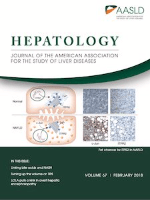
HEPATOLOGY
Scope & Guideline
Leading the way in liver disease research and clinical practice.
Introduction
Aims and Scopes
- Viral Hepatitis Research:
This area includes studies on the epidemiology, pathogenesis, and treatment of hepatitis viruses (A, B, C, D, and E), focusing on novel antiviral therapies and their clinical implications. - Liver Cancer and Oncology:
Research on hepatocellular carcinoma (HCC) and cholangiocarcinoma, including mechanisms of tumorigenesis, therapeutic strategies, and outcomes of various treatment modalities. - Liver Disease Mechanisms:
Investigations into the cellular and molecular mechanisms underlying liver diseases such as non-alcoholic fatty liver disease (NAFLD), alcohol-related liver disease, and autoimmune liver conditions. - Transplantation and Regenerative Medicine:
Studies focused on liver transplantation, including donor selection, post-transplant outcomes, and the role of stem cells and organoids in liver regeneration. - Clinical Guidelines and Practice:
The journal publishes consensus guidelines and practice recommendations to improve the management of liver diseases, emphasizing evidence-based approaches. - Innovative Diagnostic Techniques:
Research utilizing advanced diagnostic modalities such as imaging techniques, serum biomarkers, and non-invasive fibrosis assessment methods for better disease characterization. - Public Health and Epidemiology:
Articles addressing the epidemiological aspects of liver diseases, including the impact of lifestyle factors, health disparities, and public health initiatives for prevention and management.
Trending and Emerging
- Metabolic Dysfunction-Associated Fatty Liver Disease (MAFLD):
Research on MAFLD is gaining momentum, emphasizing the need for updated diagnostic criteria and treatment strategies that address the metabolic aspects of liver disease. - Artificial Intelligence in Hepatology:
The integration of AI and machine learning techniques for diagnosing liver diseases, predicting outcomes, and personalizing treatment regimens is becoming increasingly prominent. - Personalized Medicine Approaches:
Emerging studies focusing on tailoring therapies based on individual patient characteristics, genetic profiles, and specific disease phenotypes are trending. - Non-Invasive Diagnostic Modalities:
There is a marked increase in research on non-invasive techniques for diagnosing liver conditions, including transient elastography, MRI-based assessments, and blood-based biomarkers. - Gut-Liver Axis Research:
The exploration of the gut microbiome's role in liver disease pathogenesis and treatment responses is an emerging area of interest, linking gastrointestinal health to liver outcomes. - Longitudinal Studies and Real-World Evidence:
There is a growing trend towards longitudinal studies that provide real-world evidence on the effectiveness of therapies and the natural history of liver diseases. - Public Health Interventions:
Research focusing on the impact of public health policies and community-based interventions for liver disease prevention and management is gaining traction.
Declining or Waning
- Traditional Liver Biopsy Techniques:
There has been a noticeable decline in studies focused on traditional liver biopsy methods as non-invasive techniques for assessing liver fibrosis gain popularity and acceptance. - Alcohol-Induced Liver Disease:
Although still an important topic, research specifically focused on classic alcohol-induced liver disease may be waning as attention shifts towards broader metabolic dysfunction-associated liver diseases (MASH) and their multifactorial causes. - Basic Science Studies:
The journal has seen fewer purely basic science studies as there is a growing emphasis on translational research that can directly impact clinical practice and patient care. - Viral Hepatitis Monotherapy Studies:
Research focusing solely on monotherapy for hepatitis treatments is declining in favor of combination therapies that target multiple pathways and improve treatment efficacy. - Outdated Diagnostic Biomarkers:
Research on older biomarkers for liver disease diagnosis is decreasing as newer, more effective biomarkers are developed and validated.
Similar Journals
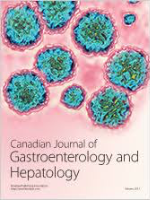
Canadian Journal of Gastroenterology and Hepatology
Championing Excellence in Gastroenterology and HepatologyCanadian Journal of Gastroenterology and Hepatology, published by HINDAWI LTD, serves as a vital resource in the fields of gastroenterology and hepatology. Since its inception in 1987, this open-access journal has made significant contributions to advancing research and clinical practice through its comprehensive coverage of topics ranging from liver diseases to gastrointestinal disorders. With an impressive Q2 ranking in Gastroenterology and a Q3 ranking in Hepatology as of 2023, the journal has established itself as an influential platform for researchers and healthcare professionals seeking to disseminate and acquire knowledge. The journal is based in Egypt, with its operational headquarters located in London, England. Notably, it holds a respectable standing in Scopus rankings, placed at Rank #64 in Gastroenterology and Rank #34 in Hepatology, reflecting its impact and relevance in the medical community. With a commitment to quality and accessibility, the Canadian Journal of Gastroenterology and Hepatology continues to foster innovation and collaboration among its readers.

JHEP Reports
Advancing healthcare knowledge through open access.JHEP Reports, published by ELSEVIER, stands at the forefront of scholarly communication in the fields of Gastroenterology, Hepatology, Immunology and Allergy, and Internal Medicine. As an Open Access journal since 2019, it provides a platform for the dissemination of high-quality research findings, making vital information readily accessible to a global audience. With a commendable impact characterized by a Q1 category ranking across four medical disciplines in 2023, JHEP Reports demonstrates its significance and influence, reflected in its impressive Scopus ranks—#11 in Gastroenterology and #14 in Internal Medicine, amongst others. This esteemed journal not only plays a critical role in advancing knowledge but also fosters collaboration among researchers, practitioners, and students keen on exploring innovations and breakthroughs in health sciences. At RADARWEG 29, 1043 NX AMSTERDAM, NETHERLANDS, JHEP Reports is committed to bridging the gap between research and application, ushering in a new era of informed and effective healthcare solutions.
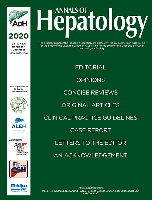
Annals of Hepatology
Unlocking the mysteries of liver health and disease.Annals of Hepatology is an esteemed open-access journal dedicated to the dynamic field of liver research and hepatology. Published by Elsevier España since 2002, this journal has established itself as a pivotal resource for researchers and clinicians alike, boasting a remarkable impact in the medical community with its 2023 rankings placing it in the Q2 quartile for Hepatology and Q1 quartile in Medicine (Miscellaneous). With an impressive Scopus rank of #20 out of 82 in the field of Hepatology and a notable 76th percentile standing, the journal is committed to disseminating high-quality, peer-reviewed articles that advance the understanding of liver diseases and their management. The editorial scope encompasses a broad range of topics, including liver pathology, therapeutic interventions, and public health implications related to hepatic disorders. Researchers, healthcare professionals, and students interested in the latest advancements in hepatology will find Annals of Hepatology an invaluable platform for sharing and accessing knowledge, with the convenience of open access enhancing global visibility and collaboration in this critical field of medicine.

Korean Journal of Gastroenterology
Empowering Clinicians with Cutting-Edge InsightsKorean Journal of Gastroenterology (ISSN: 1598-9992, E-ISSN: 2233-6869), published by the Korean Society of Gastroenterology, has been a premier outlet for research and advancements in the field of gastroenterology since its inception in 1968. This open-access journal, based in South Korea, fosters a global dialogue on gastrointestinal health, embracing contributions from a diverse array of disciplines within medicine. It is currently ranked in the Q4 quartile for miscellaneous medicine and holds a Scopus rank of #323 out of 636 in general medicine, reflecting its commitment to publishing impactful research despite its relatively recent establishment in high-impact metrics. With a continuous publication timeline extending through to 2024, the journal aims to enhance understanding of gastrointestinal disorders and promote innovative treatments, making it an essential resource for researchers, clinicians, and students alike who seek to stay abreast of the latest developments and clinical applications in gastroenterology.
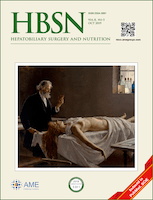
Hepatobiliary Surgery and Nutrition
Transforming surgical practices through nutritional insights.Hepatobiliary Surgery and Nutrition is a leading journal dedicated to advancing the fields of hepatobiliary surgery and nutritional science, published by AME Publishing Company. With a commitment to disseminate high-quality research, this journal serves as a vital platform for clinicians, researchers, and students alike to share their findings and insights related to liver and biliary health. The journal operates under an Open Access model, ensuring that cutting-edge research is readily available to a global audience. Although specific rankings and impact factors are currently not provided, the journal's focus on innovative surgical techniques and nutritional strategies underscores its importance in improving patient outcomes and shaping future practices in hepatobiliary medicine. Situated in Hong Kong, Hepatobiliary Surgery and Nutrition invites submissions that push the boundaries of knowledge in these crucial areas, fostering a collaborative environment for advancement in surgery and nutrition.
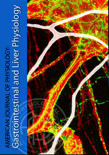
AMERICAN JOURNAL OF PHYSIOLOGY-GASTROINTESTINAL AND LIVER PHYSIOLOGY
Advancing the Frontiers of Gastrointestinal and Liver ResearchAmerican Journal of Physiology-Gastrointestinal and Liver Physiology, published by the American Physiological Society, stands as a leading journal in the domains of gastroenterology, hepatology, and overall physiology. With an impressive impact factor and consistent ranking in the Q1 quartile across multiple categories, this journal provides a vital platform for disseminating advanced research and innovative findings related to gastrointestinal and liver physiology. Since its inception in 1980, the journal has fostered a community of researchers and clinicians dedicated to understanding and improving digestive and liver health. While maintaining a traditional subscription model, it ensures high-quality peer-reviewed content that is crucial for informed professional practice and academic inquiry. The journal’s Scopus ranks highlight its significant impact in the fields of gastroenterology and hepatology, making it an indispensable resource for academics and practitioners alike, eagerly exploring both foundational and cutting-edge topics in physiology.
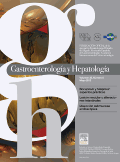
Gastroenterologia y Hepatologia
Connecting scholars to the forefront of gastroenterology and hepatology.Gastroenterologia y Hepatologia, published by Elsevier España SLU, is a distinguished journal dedicated to advancing the fields of gastroenterology and hepatology. With a publication history spanning from 1982 to 2024, this journal is recognized for its commitment to disseminating high-quality research and reviews that address critical developments in the diagnosis and treatment of gastrointestinal and liver diseases. Although it currently ranks in the Q3 quartile in both gastroenterology and hepatology based on the 2023 metrics, the journal continues to attract a global audience of researchers, healthcare professionals, and students eager to engage with the latest findings. The journal is accessible in both print and electronic formats (ISSN: 0210-5705), making its valuable insights reachable to a broad spectrum of subscribers. By fostering a platform for rigorous scholarly communication, Gastroenterologia y Hepatologia plays a vital role in shaping the future of research in these essential medical fields.
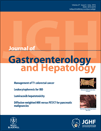
JOURNAL OF GASTROENTEROLOGY AND HEPATOLOGY
Exploring breakthroughs in gastroenterology and hepatology.Welcome to the JOURNAL OF GASTROENTEROLOGY AND HEPATOLOGY, an esteemed publication in the field of gastroenterology and hepatology, proudly published by WILEY. Established in 1986, this journal serves as a crucial platform for researchers, healthcare professionals, and students, presenting groundbreaking research and comprehensive reviews that drive advances in understanding and treating gastrointestinal and liver diseases. With a strong reputation evidenced by its Q1 ranking in gastroenterology and Q2 ranking in hepatology, this journal ranks impressively in the Scopus metrics - positioned at #22 out of 167 in gastroenterology and #21 out of 82 in hepatology, reflecting its contribution to scholarly excellence. Although it does not offer open access options, the journal’s rich archive and diverse topics make it indispensable for those dedicated to improving patient outcomes in these critical areas of medicine. Whether you are a seasoned researcher or an aspiring medical professional, engaging with this journal will keep you at the forefront of the latest developments and emerging trends in gastroenterology and hepatology research.

Hepatology Communications
Enhancing understanding of liver health worldwide.Hepatology Communications, published by Lippincott Williams & Wilkins, serves as a pioneering platform in the field of hepatology, dedicated to advancing the understanding of liver diseases and treatments. Since its inception in 2017, this open access journal has rapidly gained recognition, achieving an impressive Q1 ranking in Hepatology as of 2023, and appealing to a diverse audience of researchers, clinicians, and students alike. With its focus on high-quality research and clinical studies, the journal aims to facilitate impactful discussions and disseminate vital findings that address the challenges faced in liver health. Operating out of the United States, and accessible globally, Hepatology Communications is committed to fostering a collaborative research environment and enhancing the visibility of scholarly work in hepatology, ultimately driving forward innovations in patient care and treatment strategies.
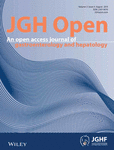
JGH Open is a prominent open-access journal dedicated to advancing knowledge in the fields of Gastroenterology and Hepatology, published by WILEY. Since its inception in 2017, the journal has served as a crucial platform for researchers, professionals, and students to disseminate innovative research findings and clinical insights. With an impact factor and Scopus rankings reflecting its steady growth—ranking in the 3rd quartile for both Gastroenterology (Q3) and Hepatology (Q3)—JGH Open is positioned within the competitive landscape of medicine. Its commitment to open access enhances the visibility and accessibility of high-quality research, ensuring that significant advancements in understanding diseases of the gastrointestinal tract and liver reach a broad audience. With a focus on collaboration and dissemination of knowledge, JGH Open aims to contribute to the global discourse and improve outcomes in gastrointestinal health.